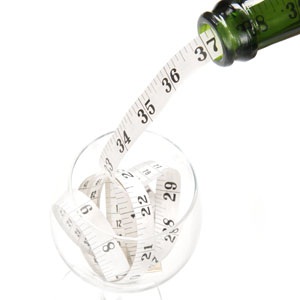You might be thinking that cutting down on your alcohol intake will help you lose weight. Correct – it will, but that doesn’t always mean by switching to low-cal wines. Here’s some food for thought if you’re trying to shed some kilos.
How is wine made anyway?
The most important thing you need to know in wine is the equation of fermentation which goes –
Sugar + Yeast = Alcohol + Carbon Dioxide.
The sugary-sweet grape juice is converted by adding yeast, or using natural yeasts to change it to alcohol. This means that technically, the riper the grapes are, the higher alcohol wine they will produce. It also means that if the alcohol is low, there is probably still sugar left unfermented in the wines.
Low alcohol/sweet wines
Wines with a low alcohol – 7-10% abv – are very often sweet. What’s happened here is that the fermentation has been stopped before all the yeast can eat all the sugar and convert it into alcohol – this is generally done by passing the wine through a filter and removing the yeast. This gives you less calories from the alcohol, but the leftover sugar is still going to keep the calorie count fairly high.
Try Fleur du Cap Natural Light 2013 (R39).
Picking early
If you like your wines dry, the alternative is to find one made from early-picked, slightly unripe grapes. A good example of this would be sparkling MCC, particularly one with zero dosage (this is the sweetening dose of grape juice most MCC’s receive just before the cork goes on), or alternatively a Sauvignon Blanc from a traditionally warm area such as Robertson or Rawsonville may also have an abv of around 11%.
Try Villiera Brut Natural 2009 (R115).
Whites are better than reds
Because red grapes take longer for the colour to develop in the skins, they tend to be harvested later than white grapes, leaving them longer in the sun thus allowing a longer time for the sugars to build up – and as we know, more sugar generally means more alcohol. A rosé might be the best compromise here.
Try Van Loveren Four Cousins Naturaly-Sweet Rose (R40) which is endorsed by Weigh-less.
The bottom line
Is that if you are drinking low-cal or low-sugar wines hoping they will help you lose weight, it doesn’t mean you can now drink twice as much because the calorie-count is lower! There isn’t a huge amount of difference between ‘diet’ wines and normal ones, and the danger is that people get so carried away with being ‘healthy’, they are actually drinking even more calories than before.
The best solution is to either dilute your wine with ice or water, alternate your wine with water or a zero-calorie drink or try and have a few wine-free days interspersed with a glass or two at the weekend.
Good luck – if you have any other drinking/dieting tips, I’d love to hear them!

